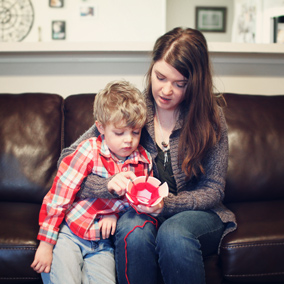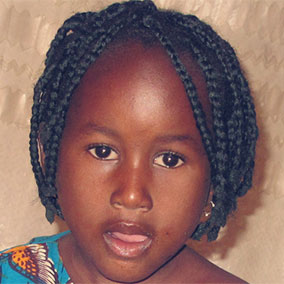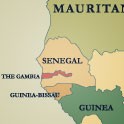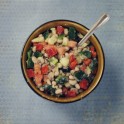Hi. I’m Aminata (ah-me-NAH-tuh). After I draw water from the well, I’ll take you to my home. This area probably looks barren to you. Our cows have trouble finding green plants and must be satisfied with nibbling leaves from the thorn bushes. When the rainy season comes, water will fill this riverbed, and the land will turn green. Our village will plant and harvest many crops, and our cattle will grow fat and happy.
I live in that small, round hut. All the homes in our village have mud-brick walls and straw roofs. My older brother is learning how to make the mud mixture used to repair our walls. This must be done before the three-month rainy season sets in. He also prepares our fields for planting and takes care of our cattle. My sister and I take turns fetching water. We both help Mother clean the house, prepare meals, and take care of the baby. My aunties are teaching us to weave mats and baskets using grasses collected near the riverbank.
Do you see my baby sister’s necklace? She’s worn it since she was eight days old. The marabout (MARE-uh-boo), our religious teacher, made it during her naming ceremony. He wrote verses from the Muslim holy book on small pieces of paper. Then he put the verses in a tiny pouch and strung it around my sister’s neck. Mother believes this necklace has the power to ward off evil spirits.
Father is praying at the mosque. You can see its tall towers in the distance. Soon he will come home, bringing his friends with him. They will sit on mats, talk, and drink three rounds of ataaya (uh-TIE-yah), hot, sweet tea. More sugar is added to the teapot in each round to make the tea sweeter. Before serving the tea, Father pours it back and forth between two small glasses until it becomes foamy. He has good aim and never spills a drop. We drink ataaya every day. My people have a saying – “Without tea and sugar, my body will die.”

Family Activity
Prep Time: 5 minutes
Activity Time: 10 minutes
Materials: a 5- or 7-ounce paper cup, scissors, yarn, and glue.
Weave your own basket. Starting at the rim of the cup, cut a straight line down to the base. Continue around the top of the cup, making 6 more evenly-spaced cuts. Gently press the spokes down to form a flower shape with the circular base of the cup in the center. Tie one end of your piece of yarn around the base of one spoke, making sure that the knot is on the inside. Weave the yarn over and under the spokes, making a complete circle near the base of the cup. Now weave a new row right above the first one. Continue weaving upwards until you reach the rim of the cup. After you complete each row, push the yarn down towards the base of the cup. If your yarn piece is getting too short, or if you want to change colors, tie a new piece of yarn to the end of the old one, making sure the knot is on the inside. When you are finished weaving, cut off any excess yarn and secure it by gluing around the top of the cup.
Bible:
- Tukulor families fear evil spirits and use charms and spells to protect themselves.
- Many of the Tukulor are oral learners.
Pray:
- Pray that they will come to know Jesus and trust in him to provide for their needs and keep them from harm.
- Pray for them to hear about Jesus through storytelling, Christian radio broadcasts, and gospel recordings.
Tukulor
Salatu Niebe
Black-Eyed Pea Salad
West Africa
Preparation Time: 45 | Serves: 6-8
Ingredients
- ½ pound (1-1½ cups) of dried black eyed peas, rinsed and soaked in hot water for 1 hour
- 1 cucumber
- 1 red bell pepper
- 1 tomato
- 1 green onion
- 1 mild green chile
- 2 limes






